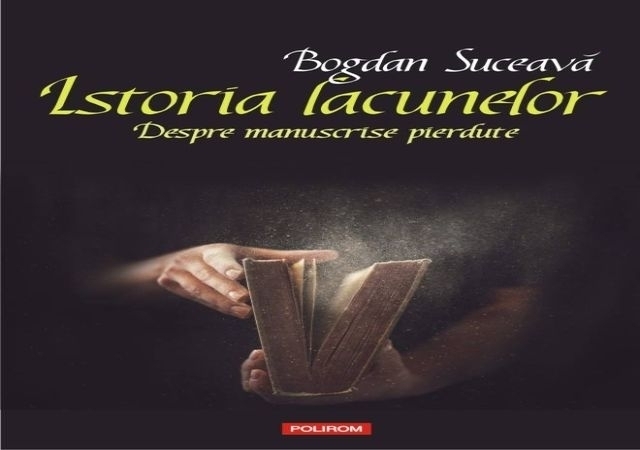On lost manuscripts with writer Bogdan Suceava
Bogdan Suceava's latest book is called “The History of Lapses. On Lost Manuscripts

Corina Sabău, 13.01.2018, 11:27
“From Aristotle to Hemingway, there is an entire history of manuscripts that are forever lost and which might have revolutionised literature, philosophy, mathematics and physics. How tragic is the definitive loss of a manuscript? But what if the author of the lost manuscript wrote other invaluable works?” These are some of the questions posed by the writer and mathematician Bogdan Suceava in his new book published at the end of 2017 by Polirom, called “The History of Lapses. On Lost Manuscripts”. On 22nd December 1989, when the Romanian Revolution broke out, Bogdan Suceava, who at the time was a student at the Faculty of Mathematics in Bucharest, saw the Central University Library on fire. “In the middle of Bucharest, and no one could do anything about it. Lots of rumours circulated. I don’t know the cause of the fire, but I remember thinking: so that’s how libraries burn. That’s how the Library of Alexandria must have burnt”, writes Bogdan Suceava. That incident appears to be one of the triggers for his new book. A professor at the Department of Mathematics at the California State University in Fullerton and the author of 13 books of prose and several books on the history of mathematics, Bogdan Suceava tells us he believes a review of the most important lost manuscripts is more necessary than ever:
“I thought this book was necessary first of all in order to clarify my own image about literature and the role of the novel today. At the end of the day, we can ask ourselves why we still read and why we still write novels. What if the future holds a world in which we will no longer read novels? Is this the time certain literary genres are beginning to die out and interest in the traditional values of literature begins to dwindle? I believe the short answer is no, I think people will keep on reading. I believe we will always be able to find a type of story, a type of novel that will be necessary in the future, just they have always been necessary in the past. And I said to myself books that are absolutely necessary are the books that help us reconstruct scenes from the past, moments that seem relevant for the world we live in. Filling up such obscure moments-episodes of the past with a well-written story seems to me absolutely useful and it’s all about a special kind of usefulness as regards culture. And I don’t think something like that could be replaced by social network posts, messages or video-clips. There are certain things which are purely literary, while the reconstruction of several important pages of the past seems to guarantee the viability of the novel as a genre.”
“Once the book is lost, maybe the happiest twist in the tale could be fate of the second part of Aristotle’s Poetics, which means that another author, such as Umberto Eco, should invent a story over the ruins of absence. And that is not necessarily the initial book, about which we all agree it has been lost forever, but speculation on the context of its disappearance. And that could turn into a novel”, Bogdan Suceava writes.
“With ‘The Name of the Rose’ I was lucky, I read it when I was seventeen, and I realized rather early in my life that there was something very important there. Yet there was another important moment, the moment I prepared a course in the history of mathematics, trying to compile a list of the things I would teach for that course. And that’s how I found out that many books from the Classical Antiquity period were missing. For instance, I discovered that a volume written by Cicero, a book that Saint Augustine liked a lot and which meant a great deal for the progress of young Augustine, was actually missing, it had disappeared. And that may really hurt you, at a very personal level. And you actually want to find out what has happened with the memory of humankind. But that dawned upon me very late in my life. I think you need to be old enough to be able to appreciate the true value of such a loss. I realized that over the past two years.”
Bogdan Suceava chose to leave for the United States, as he wanted to study mathematics under the supervision of a famous Chinese specialist, whom he also mentions in his recently launched volume “The History of Lapses. On lost manuscripts”. Bogdan Suceava earned his PhD in Mathematics from the Michigan State University, in 2002. He currently holds a teaching position with the California State University. Notwithstanding, he has returned to literature from time to time:
“I believe literature makes us more wholesome. I for one do need literature and I think that were I only to stick to my technical endeavour, that would mean way too little. It may come as some sort of impoverishment, as some sort of dwindling of one’s own self. There were years when I didn’t write anything. Between 1996 and 1999 I had to prepare for some exams in mathematics, that were very tough. It was very hard, very tough, I didn’t write anything for three good years. One of the most difficult exams was in May 1999. I was 28 and I suspected myself of being unable to memorize anything. Three days before that exam I started writing again. It was like a moment of liberation, of necessary liberation. We need to be wholesome and in order to be wholesome, we need literature.”
The CopyRo Prize that Bogdan Suceava received in 2002 for the volume “The Empire of Tardy Generals and Other Histories”, the Bucharest Writers’ Association’s Prize for Fiction, awarded for his novel “Miruna, a Tale” and the Literary Network’s 1st prize for “The Night When Someone Died for You” are some of the prizes which reward Bogan Suceava’s literary activity. (Translated by C. Mateescu & E. Nasta)





























